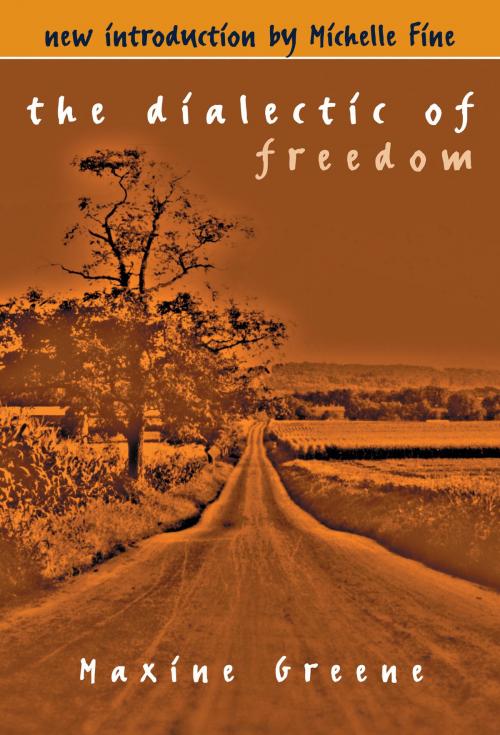The Dialectic of Freedom
Nonfiction, Reference & Language, Education & Teaching, Educational Theory, Aims & Objectives, Philosophy & Social Aspects, Religion & Spirituality, Philosophy| Author: | Maxine Greene | ISBN: | 9780807776384 |
| Publisher: | Teachers College Press | Publication: | December 15, 2009 |
| Imprint: | Language: | English |
| Author: | Maxine Greene |
| ISBN: | 9780807776384 |
| Publisher: | Teachers College Press |
| Publication: | December 15, 2009 |
| Imprint: | |
| Language: | English |
Special 2018 Edition
From the new Introduction by Michelle Fine, Graduate Center, CUNY :
"Why now, you may ask, should I return to a book written in 1988? Because, in Maxine's words: 'When freedom is the question, it is always time to begin.'"
In The Dialectic of Freedom, Maxine Greene argues that freedom must be achieved through continuing resistance to the forces that limit, condition, determine, and—too frequently—oppress.
Examining the interrelationship between freedom, possibility, and imagination in American education, Greene taps the fields of philosophy, history, educational theory, and literature in order to discuss the many struggles that have characterized Americans’ quests for freedom in the midst of what is conceived to be a free society. Accounts of the lives of women, immigrants, and minority groups highlight the ways in which Americans have gone in search of openings in their lived situations, learned to look at things as if they could be otherwise, and taken action on what they found.
Greene presents a unique overview of American concepts and images of freedom from Jefferson’s time to the present. She examines the ways in which the disenfranchised have historically understood and acted on their freedom—or lack of it—in dealing with perceived and real obstacles to expression and empowerment. Strong emphasis is placed on the focal role of the arts and art experience in releasing human imagination and enabling the young to reach toward their vision of the possible.
The author concludes with suggestions for approaches to teaching and learning that can provoke both educators and students to take initiatives, to transcend limits, and to pursue freedom—not in solitude, but in reciprocity with others, not in privacy, but in a public space.
“Greene triumphs in her search for a critical aesthetic to inform education.”
—Harvard Educational Review
“It is a book that deserves to be read by all who teach.”
—Journal of Aesthetic Education
Special 2018 Edition
From the new Introduction by Michelle Fine, Graduate Center, CUNY :
"Why now, you may ask, should I return to a book written in 1988? Because, in Maxine's words: 'When freedom is the question, it is always time to begin.'"
In The Dialectic of Freedom, Maxine Greene argues that freedom must be achieved through continuing resistance to the forces that limit, condition, determine, and—too frequently—oppress.
Examining the interrelationship between freedom, possibility, and imagination in American education, Greene taps the fields of philosophy, history, educational theory, and literature in order to discuss the many struggles that have characterized Americans’ quests for freedom in the midst of what is conceived to be a free society. Accounts of the lives of women, immigrants, and minority groups highlight the ways in which Americans have gone in search of openings in their lived situations, learned to look at things as if they could be otherwise, and taken action on what they found.
Greene presents a unique overview of American concepts and images of freedom from Jefferson’s time to the present. She examines the ways in which the disenfranchised have historically understood and acted on their freedom—or lack of it—in dealing with perceived and real obstacles to expression and empowerment. Strong emphasis is placed on the focal role of the arts and art experience in releasing human imagination and enabling the young to reach toward their vision of the possible.
The author concludes with suggestions for approaches to teaching and learning that can provoke both educators and students to take initiatives, to transcend limits, and to pursue freedom—not in solitude, but in reciprocity with others, not in privacy, but in a public space.
“Greene triumphs in her search for a critical aesthetic to inform education.”
—Harvard Educational Review
“It is a book that deserves to be read by all who teach.”
—Journal of Aesthetic Education















